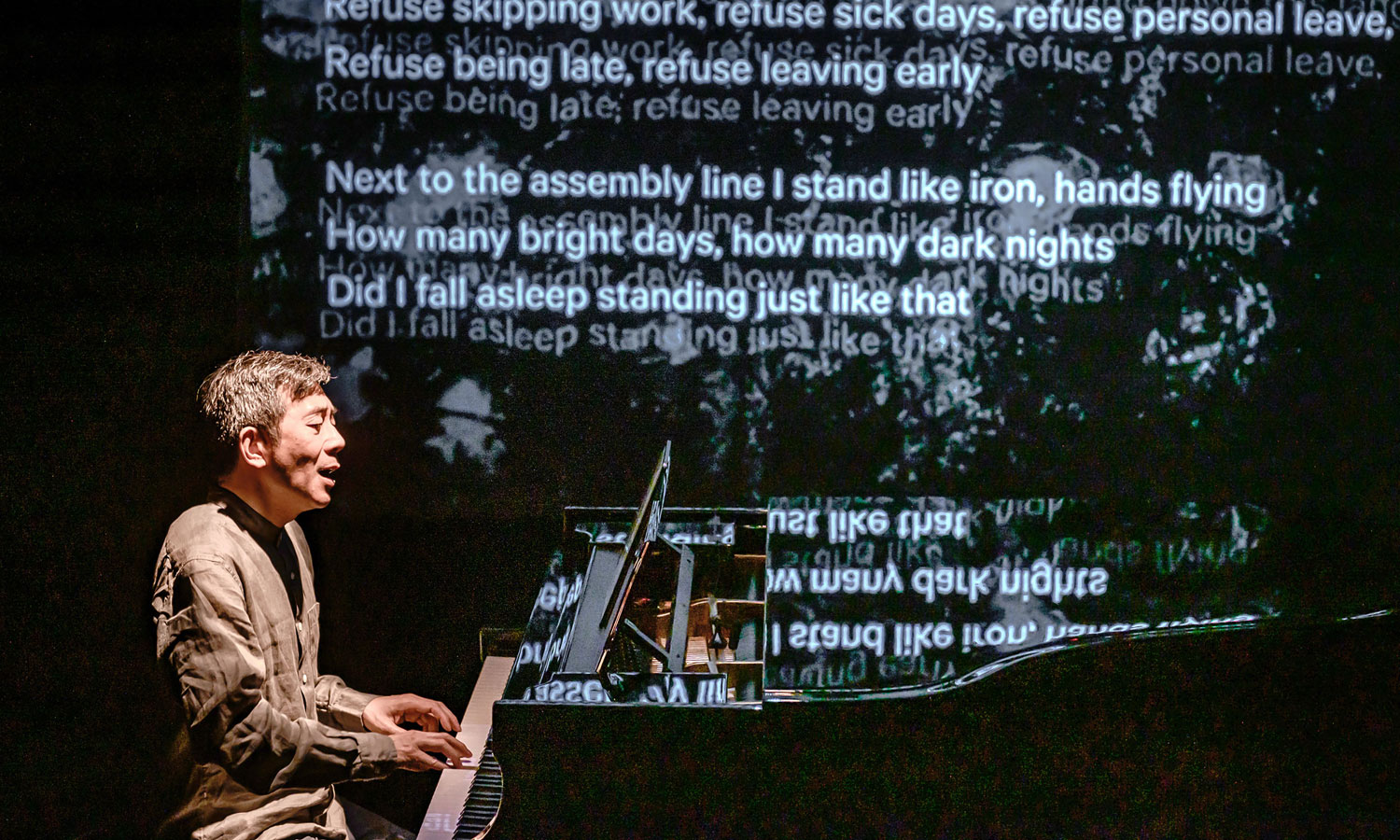With today’s news cycle in the throes of geopolitics and ongoing humanitarian crises, it can be easy to overlook the exploitation and oppression most suffer under the global status quo. Yet there couldn’t be a more prescient time to encounter the captivating, stark, and haunting poetry of the late Xu Lizhi (1990-2014) through the movement, song, and embodiment by Canadian composer and performer Njo Kong Kie in I Swallowed a Moon Made of Iron.
Never has the 600-odd seat Dunstan Playhouse felt so isolating and austere as when we see the performer enter and observe a metallic cube under a tight beam of light on stage.
He crawls and weaves under an ominous, black grand piano that is at once Xu’s ceiling in a Shenzhen flat, his grave, and his sanctuary. Above, a projection screen hangs, showing rolling text in Chinese. Later, this screen displays Xu’s laconic words bilingually atop dream-like visualisations, as Njo plays and sings in Mandarin. This staging, including the clinical pale hues of the lighting, give a clear image of the worker-poet’s desperate isolation, and his artistic imprisonment in the infamous Foxconn electronics factory where he took his own life in 2014.

The staging emphasises the worker-poet’s desperate isolation. Photo: Dahlia Katz
The form of the piece is a song cycle. We sometimes get brief silent glimpses of movement from Njo between songs – perhaps abstracted expressions of Xu’s daily torments, such as pacing in his tiny flat – but the words are rightly the focus of I Swallowed a Moon Made of Iron. The creatives have clearly endeavoured, above all, to honour the poet’s breathtaking work through music.
From the halting brutality of Rented Room – “Here I eat, sleep, Shit, ponder / cough, have migraines / grow old / get sick but don’t die” – to the bemusement expressed over soul-numbing and crushing industrial production in Working Life, to the heartbreaking nostalgia of Mother, Xu’s poetry is beautiful, haunting, and stark.
This reviewer was especially moved by the final piece, I know the day will come, which shares the transcendental air and distance from death with David Bowie’s “I Can’t Give Everything Away”, but with the added tragedy of Xu’s suicide in 2014, and the loss of a young artist due to contemporary economic circumstances.

The words are the focus of I Swallowed a Moon Made of Iron. Photo: Dahlia Katz
The show begs the question: How many great painters, poets, composers, or philosophers have we lost to the unending drive to greater ‘economic growth’, ‘industrialisation’ and ‘consumption’? And when will we come to terms with the human costs of our desires for getting things ‘faster’, ‘better’, and ‘more conveniently’?
When will we finally see the invisible workers that drive today’s capitalism?
Despite this, one should resist a reading of this piece related to personal guilt around purchasing the latest gadgets. Xu Lizhi’s words mourn the people living and dead throughout industrial history, whose “beauteous youthfulness / is entombed on the assembly line / by their own hands”. All should encounter Xu’s poetry, but Njo offers a compelling dramatic frame in which to experience his words.
I Swallowed a Moon Made of Iron is a captivating and challenging piece that will cause anyone to contemplate the realities of modern global capitalism, and the human costs of information technology.
If this article has raised issues for you, you can get help 24/7 by phoning Lifeline on 13 11 14 or the Suicide Call Back Service on 1300 659 467. If you or someone you know is in immediate danger, phone 000 for emergency services.

Get InReview in your inbox – free each Saturday. Local arts and culture – covered.
Thanks for signing up to the InReview newsletter.
Some of Xu Lizhi’s poems are available here in translation. I Swallowed a Moon Made of Iron plays again at the Dunstan Playhouse on Thursday, October 26, as part of the 2023 OzAsia Festival. Read more OzAsia stories and reviews here.
Support local arts journalism
Your support will help us continue the important work of InReview in publishing free professional journalism that celebrates, interrogates and amplifies arts and culture in South Australia.
Donate Here




